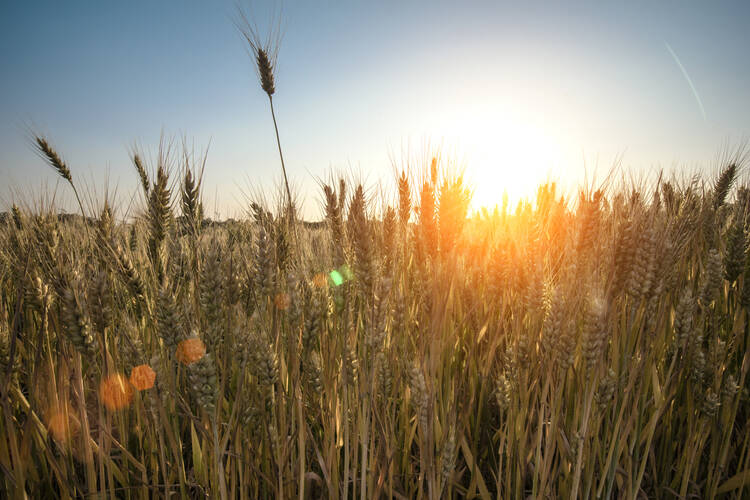Often, we speak of it even before we ask after each other. We mention how it appeared, the last time we looked. We speculate on what the heat or the cold or the wind or the snow is doing to it. If we’ve driven a few hours in any direction—something easily and often done on the plains—we return with a report of how the wheat looked out west, up north, down south or back east. We “laity” even speculate about the harvest looking good. Farmers never do, because even the best of fields can disappear in a few minutes of hail storm.
It’s been this way for a century and a half, ever since German-Russian Mennonite farmers brought winter wheat to Kansas, a crop planted in the fall, which lies fallow through winter snows, only to burst into high green grass in the spring. Harvest comes at the beginning of each summer. That is when the perennial Kansas topic—how much rain did you get?—gives way to talk of bushels per acre: out west, up north, down south, back east.
Christ is the seed that has died, has been planted and has sprung again to life.
According to Acts, it was at Pentecost that the Holy Spirit descended upon the apostolic band. They were at prayer on the Jewish feast of Shavuot, which had a double significance in Israel. It was the time of the spring wheat harvest, and it also marked the day that the Lord God gave the Torah to the entire people. So, you see, what the Good Lord gave to the people and what he asked in return were, both of them, measurable and metered.
In Christian thought, we don’t make much of the Holy Spirit coming at the time of the spring harvest feast, though it offers an important insight into the mission of the Spirit in the world. Christ is the seed that has died, has been planted and has sprung again to life. The Spirit is the Lord of the Harvest. The Spirit brings it, brings us, to fruition. What Christ sows, the Spirit tills.
What Christ sows, the Spirit tills.
Watching the industrial revolution darken England’s skies and land, the Jesuit poet Gerard Manley Hopkins sadly saw sin growing in tandem with progress, but he insisted that the Holy Spirit would again green God’s harvest.
The world is charged with the grandeur of God.
It will flame out, like shining from shook foil;
It gathers to a greatness, like the ooze of oil
Crushed. Why do men then now not reck his rod?
Generations have trod, have trod, have trod;
And all is seared with trade; bleared, smeared with toil;
And wears man’s smudge and shares man’s smell: the soil
Is bare now, nor can foot feel, being shod.
And for all this, nature is never spent;
There lives the dearest freshness deep down things;
And though the last lights off the black West went
Oh, morning, at the brown brink eastward, springs--
Because the Holy Ghost over the bentWorld broods with warm breast and with ah! bright wings.
The Trinity is at work in our world. The Son, who is seed, has been planted in our hearts. But there is a long, cold and often dry winter between seeding and harvest. We pass through so many trials and temptations in this life. We grow weary, doubtful, even listless. At times a life of grace seems all but spent. Yet, in our lives, the Spirit “broods with warm breast and with ah! bright wings.”
God enters the world as actor only in the person of Jesus the Christ. God the Father plants us within the world, roots us in the Son. God the Holy Ghost, as spirit, cannot be seen, though we sense his presence in every work of grace. In the words of the Pentecost sequence:
Where you are not, we have naught,
Nothing good in deed or thought,
Nothing free from taint of ill.
Heal our wounds, our strength renew;
On our dryness pour your dew;
Wash the stains of guilt away:
Bend the stubborn heart and will;
Melt the frozen, warm the chill;
Guide the steps that go astray.
On the faithful, who adore
And confess you, evermore.










